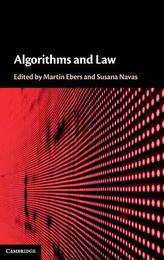
|
Algorithms and Law
Hardback
Main Details
| Title |
Algorithms and Law
|
| Authors and Contributors |
Edited by Martin Ebers
|
|
Edited by Susana Navas
|
| Physical Properties |
| Format:Hardback | | Pages:319 | | Dimensions(mm): Height 235,Width 158 |
|
| Category/Genre | Artificial intelligence |
|---|
| ISBN/Barcode |
9781108424820
|
| Classifications | Dewey:343.0999 |
|---|
| Audience | | Professional & Vocational | |
|---|
| Illustrations |
Worked examples or Exercises; 1 Tables, black and white; 1 Halftones, black and white
|
|
Publishing Details |
| Publisher |
Cambridge University Press
|
| Imprint |
Cambridge University Press
|
| Publication Date |
23 July 2020 |
| Publication Country |
United Kingdom
|
Description
Algorithms permeate our lives in numerous ways, performing tasks that until recently could only be carried out by humans. Artificial Intelligence (AI) technologies, based on machine learning algorithms and big-data-powered systems, can perform sophisticated tasks such as driving cars, analyzing medical data, and evaluating and executing complex financial transactions - often without active human control or supervision. Algorithms also play an important role in determining retail pricing, online advertising, loan qualification, and airport security. In this work, Martin Ebers and Susana Navas bring together a group of scholars and practitioners from across Europe and the US to analyze how this shift from human actors to computers presents both practical and conceptual challenges for legal and regulatory systems. This book should be read by anyone interested in the intersection between computer science and law, how the law can better regulate algorithmic design, and the legal ramifications for citizens whose behavior is increasingly dictated by algorithms.
Author Biography
Martin Ebers is Associate Professor of IT Law at the University of Tartu and a permanent research fellow at the Humboldt University of Berlin. He is also the co-founder and president of the Robotics & AI Law Society (RAILS). Along with researching and teaching, he has been active in the field of legal consulting for many years. His main areas of expertise and research are IT law, private law, insurance law and European law. Professor Ebers is the author of Rights, Remedies and Sanctions in EU Private Law (2015). Susana Navas is Full Professor for Private Law at the Autonomous University of Barcelona. Her diverse fields of interest range from child law and copyright law to European private law. Recently, she has also devoted herself to the study of digital law and is a co-author of Inteligencia artificial Tecnologia Derecho (2017). Professor Navarro has enjoyed research stays at both European and North American institutions and has been a key speaker at conferences and workshops across Europe.
Reviews'There is a shift in the academic debate from the 'if' to the 'how' AI should and could be regulated. This volume covers a broad range of fields, from robotics to copyrights and financial services, all united in one question: what would a regulatory framework that allows us to de-mystify algorithms and get to grips with the commercialisation of data look like? The regulatability of AI is the key issue of our times. The ten contributions provide dense up-to-date information and enticing inspiration in the search for societally acceptable solutions.' Hans W. Micklitz, European University Institute 'A timely book that finely addresses a crucial issue in the age of digitalization - the governance of algorithms - and helps to identify a new and necessary field of legal studies.' Ugo Pagallo, University of Turin 'The ubiquity of algorithms in many areas of our lives has become one of the burning issues of our time, with legislators and policy-makers around the world grappling with the many challenges associated with Artificial Intelligence and Algorithms. This development is significant for many disciplines, including law. This collection of essays examines many of the legal issues of AI and algorithms and illustrates just how complex an area this has become. It will be welcomed by any reader interested in understanding the many legal and ethical questions which need to be resolved.' Christian Twigg-Flesner, University of Warwick 'The book accomplishes a difficult task. It is an excellent source for those who dive for the first time into the legal challenges that AI poses to law ... The book is written in such a clear manner that it allows an interdisciplinary understanding. The authors and editors should be applauded for the clarity with which they explore an extremely complex subject.' Francisco de Elizalde, Prometheus
|